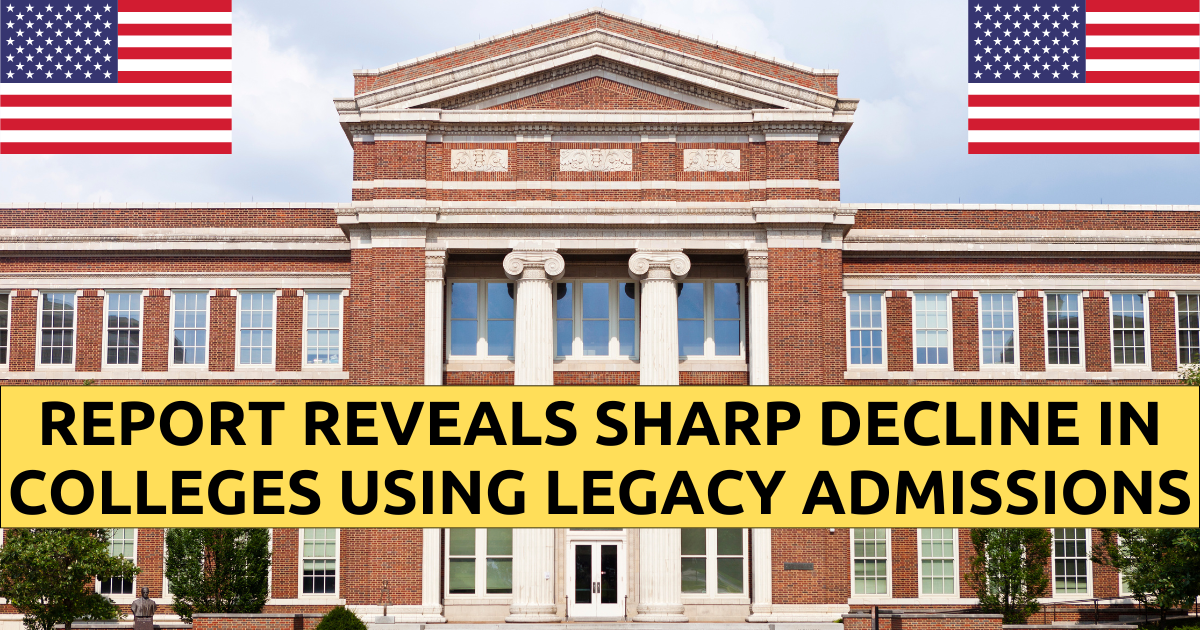Report Reveals Sharp Decline in Colleges Using Legacy Admissions. Education Reform Now (ERN) has announced its new report, which says that the legacy admissions that are showing relatives of alumni and donors admission preference are now on the decline. It shows that more than half of the colleges and universities that once considered legacy status no longer do so over the past decade. Please read the full article to learn the full details about the sharp decline in colleges using legacy admissions.
Report Reveals Sharp Decline in Colleges Using Legacy Admissions
Over half of the colleges and universities that once gave an admission preference to the relatives of alumni have discontinued doing so in the past decade. The new report has been issued by Education Reform Now (ERN) and is named “Future of Fair Admissions: Issue Brief 5: Legacy Admissions in 2025.” This report is based on data from 2023 from the Department of Education to come to its findings.

The report states, as an outcome of the rapid decline, “The profoundly unfair practice of passing an admissions advantage in college admissions along family bloodlines may well be on its way to disappearing altogether from higher education thanks to a combination of legislative action and public disgust with the priorities elite colleges and universities feel the need to protect.”
This decline results from both voluntary institutional decisions and new state legislation. In 2024, California, Illinois, Maryland, and Virginia joined Colorado in restricting legacy admissions via state laws. The report shows that 86% of colleges that discontinued legacy consideration did so voluntarily, while 14% were mandated by state legislation. Several more states are expected to introduce similar legislation in 2025.
What are Legacy Admissions?
Legacy admissions are the preferential treatment provided to eligible individuals who have familial ties—typically parents, but in some cases grandparents or siblings—to alumni of a particular institution. In simple terms, it means that a student applying to a college or university has a benefit in the admission process solely based on their family’s history with the institution or university. This practice is more common at elite and highly selective universities, though some public institutions also apply it.
Legacy preferences are still most established at selective private institutions, especially in the Northeast. Over half of colleges that admit 25% or fewer applicants still offer benefits to alumni children. The practice is now uncommon at public institutions, with just 11% still thinking about legacy status. In 24 states, no public colleges provide legacy preferences at all. New York stands out as having the highest concentration of colleges maintaining legacy admissions, with one in seven U.S. institutions still using the practice located in the Empire State.
Ban on Legacy Admissions
The Supreme Court’s decision last year to ban race-conscious admissions in higher education highlights the significance of broadening college access by disqualifying unfair recruitment admissions and enrollment policies. The decision has generated increased examination of legacy admissions, forcing policymakers in various states to adopt legislation to end the practice. More than 100 institutions have discontinued legacy policies since 2015, and three states have banned legacy admissions at public institutions. But as this report indicates, further actions are required to broaden access at exclusive institutions, especially for students who have been historically excluded on the basis of race or income.
Currently, five states have banned this practice. They are California, Colorado, Illinois, Maryland, and Virginia.
Justification by Universities
Many colleges and universities that provide a legacy preference mostly give two justifications for the practice. The first is according to them; they will earn more as the parents will give them more private donations from alumni if they provide an advantage to their children. In return, the college will help lower-income students to get benefits from the raise. They think of it as Ivory Tower trickle-down. Moreover, they claim that students of those parents who have attended college are more inclined to keep going and eventually complete an undergraduate degree than those students whose parents did not attend college. It’s higher ed’s Darwinian formula—the survival of the well-heeled.
Conclusion
There are many colleges that are discontinuing the legacy preference admissions. However, due to this, they may get effected as it might cause frustration among some alumni. They might stop providing donations to the college and not send their children to that university. Although it might not cause a big trouble. More and more colleges are advised to follow their lead and discontinue this practice for good.
